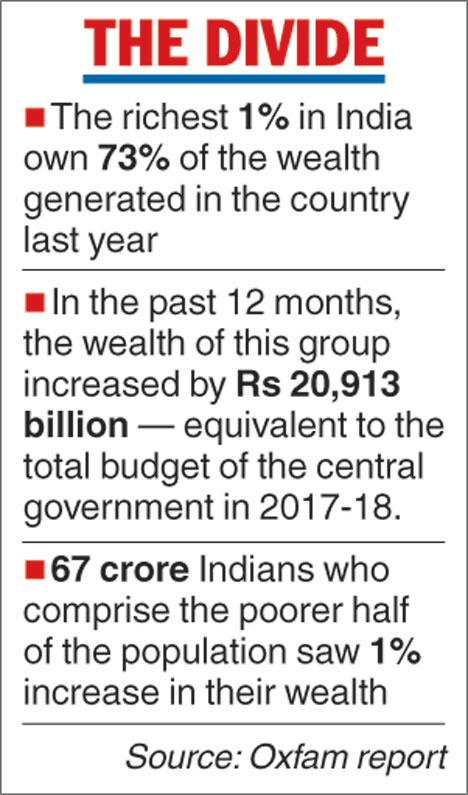
New Delhi: Those who inhabit the top 1 per cent of the wealth pyramid in India own 73 per cent of the wealth generated in the country last year, an NGO has claimed.
In the last 12 months, the "wealth of this elite group increased by Rs 20.91 lakh crore. This amount is equivalent to the total budget of the central government in 2017-18," Oxfam India said in a statement after culling facts and statistics from a report titled "Reward Work, Not Wealth" that was released ahead of meeting of the World Economic Forum in Davos where Prime Minister Narendra Modi is a keynote speaker at the plenary session on Tuesday.
India added 17 new billionaires last year, raising the number to 101 billionaires. Indian billionaires' wealth increased by Rs 4.89 lakh crore - from Rs 15.78 lakh crore to over Rs 20.67 lakh crore, the report said.
But the piece of statistic that could deeply embarrass Modi is the report's contention that 67 crore Indians, who comprise the poorest half of the population, saw just 1 per cent increase in their wealth.

The Oxfam report said the number of billionaires worldwide increased by an unprecedented rate of one every two days in the 12 months between March 2016 and March 2017. Billionaire wealth has risen by an average of 13 per cent - six times faster than the wages of ordinary workers, which have risen by a yearly average of just 2 per cent.
However, top Indian economists have expressed some doubts about the quality of data used in arriving at these alarming conclusions, which would imply that inequality has risen dramatically in just three years and caution against using such data for policy making.
Said M. Govinda Rao, a former member of the Prime Minister's Economic Advisory Council: "There is little hard data to go by in estimating income inequality."
The Oxfam study drew on data sourced from Credit Suisse's "Global Wealth Databook" and UN population statistics.
Added Pronab Sen, a former chairman of the National Statistical Commission: "Wealth measurement is problematic as it is based on property and share valuations and these tend to fluctuate hugely."
The obvious policy implication from such data would be on taxation, with possible calls for a hike in taxes on the rich to better redistribute wealth and income.
However, Rao asserted that "inequality cannot be reduced by taxation. Reducing the income of the rich does not increase the income of the poor. We need to spend on schemes which could help generate income and wealth for the poorer sections."
"The answer does not lie in (socialist-style) redistributive policies but rather on expenditure side focusing. A mere 2 per cent of Indians pay taxes. Increasing their burden is not the answer."
Said Sen: "Whatever doubts we have on data quality, there is no gainsaying that there is need to address inequality, (but) this has to be done by generating greater income for the poor and creating better quality jobs in our farms and factories."
Oxfam estimates that the huge increase in global wealth could have ended extreme poverty seven times over. While 82 per cent of all wealth created globally in the last year went to the top 1 per cent, the bottom 50 per cent saw no increase at all.
The activist organisation said: "Governments must create a more equal society by prioritising ordinary workers and small-scale food producers instead of the rich and powerful."
It pointed out that in countries like India and the Philippines, at least one in every two workers in the garment sector are paid below the minimum wage, compared to 37 per cent in Pakistan and 25 per cent in Cambodia.
In India, it will take 941 years for a minimum wage worker in rural India to earn what the top paid executive at a leading Indian garment firm earns in a year, the study found. In the US, it takes slightly over one working day for a CEO to earn what an ordinary worker makes in a year, it added.
Nisha Agrawal, CEO of Oxfam India, said: "It is alarming that the benefits of economic growth in India continue to concentrate in fewer hands. The billionaire boom is not a sign of a thriving economy but a symptom of a failing economic system. The growing divide undermines democracy and promotes corruption and cronyism."











